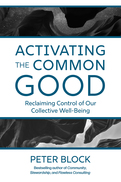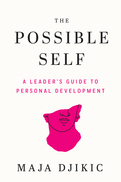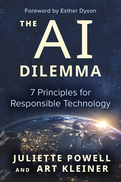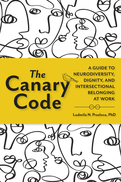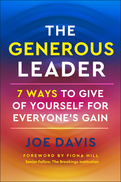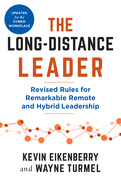Search Results: "The Millennial Myth"
Results 13-18 of 1167
A powerful, inspiring, and achievable vision of a society based on cooperation and community instead of competition and commodification.
This book counters the dominant and destructive story that we are polarized, violent, selfish, and destined to consume everything in sight. That is not who we are.
The challenge, Peter Block says, is that we are suffering under an economic theology that is based on scarcity, self-interest, competition, and infinite growth. We're told we can purchase and outsource all that matters. Block calls this the business perspective narrative. It dominates not only the economy but also architecture, faith communities, journalism, arts, neighborhoods, and much more.
Block offers an antidote: the common good narrative. It embodies the belief that we are basically communal and cooperative. And that we have the capacity to communally produce what we care most about: raising a child, safety, livelihood, health, and a clean and sustainable environment.
This book describes how shifts to the common good perspective could transform many areas, fostering journalism that reports on what works, architecture that designs habitable spaces creating connection, faith collectives that build community, a market that is restrained and local, and leadership and activism that build social capital by creating trust among citizens. With these shifts, we would fundamentally change the world we live in for the better.
This book counters the dominant and destructive story that we are polarized, violent, selfish, and destined to consume everything in sight. That is not who we are.
The challenge, Peter Block says, is that we are suffering under an economic theology that is based on scarcity, self-interest, competition, and infinite growth. We're told we can purchase and outsource all that matters. Block calls this the business perspective narrative. It dominates not only the economy but also architecture, faith communities, journalism, arts, neighborhoods, and much more.
Block offers an antidote: the common good narrative. It embodies the belief that we are basically communal and cooperative. And that we have the capacity to communally produce what we care most about: raising a child, safety, livelihood, health, and a clean and sustainable environment.
This book describes how shifts to the common good perspective could transform many areas, fostering journalism that reports on what works, architecture that designs habitable spaces creating connection, faith collectives that build community, a market that is restrained and local, and leadership and activism that build social capital by creating trust among citizens. With these shifts, we would fundamentally change the world we live in for the better.
The Possible Self
2024
Sometimes success isn't enough-discover how to achieve lasting, whole-life fulfillment through a simple five-stage plan that corresponds with the five key parts of ourselves.
We're often told that the key to success in life involves advancing in our careers, so why do feel stuck and unfulfilled when everything seems to be going right?
Adult development expert Maja Djikic explains that in order to discover our purpose and achieve real, lasting change, we need to move beyond narrowly targeted ideas and strategies like changing our mindset or slightly altering one aspect of our behavior. Instead, we need to go deeper and focus on our innate desires.
Djikic says that sustained change can only happen when our whole self moves holistically the same direction and at the same time. She introduces a transformational system called the Wheel of Change—a simple, five-segment plan that corresponds with the five key parts of ourselves: Desires, Actions, Emotions, Thoughts, and Body.
By understanding the mechanisms of these five integral parts, you will be able to escape the paradox of success without happiness and move towards your own path of fulfilling self-development.
We're often told that the key to success in life involves advancing in our careers, so why do feel stuck and unfulfilled when everything seems to be going right?
Adult development expert Maja Djikic explains that in order to discover our purpose and achieve real, lasting change, we need to move beyond narrowly targeted ideas and strategies like changing our mindset or slightly altering one aspect of our behavior. Instead, we need to go deeper and focus on our innate desires.
Djikic says that sustained change can only happen when our whole self moves holistically the same direction and at the same time. She introduces a transformational system called the Wheel of Change—a simple, five-segment plan that corresponds with the five key parts of ourselves: Desires, Actions, Emotions, Thoughts, and Body.
By understanding the mechanisms of these five integral parts, you will be able to escape the paradox of success without happiness and move towards your own path of fulfilling self-development.
The AI Dilemma
2023
The misuse of AI has led to wrongful arrests, denial of medical care, even genocide-this book offers 7 powerful principles that business can use now to end the harm.
AI holds incredible promise to improve virtually every aspect of our lives, but we can't ignore its risks, mishaps and misuses. Juliette Powell and Art Kleiner offer seven principles for ensuring that machine learning supports human flourishing. They draw on Powell's research at Columbia University and use a wealth of real-world examples.
Four principles relate to AI systems themselves. Human risk must be rigorously determined and consciously included in any design process. AI systems must be understandable and transparent to any observer, not just the engineers working on them. People must be allowed to protect and manage their personal data. The biases embedded in AI must be confronted and reduced.
The final three principles pertain to the organizations that create AI systems. There must be procedures in place to hold them accountable for negative consequences. Organizations need to be loosely structured so that problems in one area can be isolated and resolved before they spread and sabotage the whole system. Finally, there must be psychological safety and creative friction, so that anyone involved in software development can bring problems to light without fear of reprisal.
Powell and Kleiner explore how to implement each principle, citing current best practices, promising new developments, and sobering cautionary tales. Incorporating the perspectives of engineers, businesspeople, government officials, and social activists, this book will help us realize the unprecedented benefits and opportunities AI systems can provide.
AI holds incredible promise to improve virtually every aspect of our lives, but we can't ignore its risks, mishaps and misuses. Juliette Powell and Art Kleiner offer seven principles for ensuring that machine learning supports human flourishing. They draw on Powell's research at Columbia University and use a wealth of real-world examples.
Four principles relate to AI systems themselves. Human risk must be rigorously determined and consciously included in any design process. AI systems must be understandable and transparent to any observer, not just the engineers working on them. People must be allowed to protect and manage their personal data. The biases embedded in AI must be confronted and reduced.
The final three principles pertain to the organizations that create AI systems. There must be procedures in place to hold them accountable for negative consequences. Organizations need to be loosely structured so that problems in one area can be isolated and resolved before they spread and sabotage the whole system. Finally, there must be psychological safety and creative friction, so that anyone involved in software development can bring problems to light without fear of reprisal.
Powell and Kleiner explore how to implement each principle, citing current best practices, promising new developments, and sobering cautionary tales. Incorporating the perspectives of engineers, businesspeople, government officials, and social activists, this book will help us realize the unprecedented benefits and opportunities AI systems can provide.
The Canary Code
2024
Exclusion robs people of opportunities, and it robs organizations of talent. In the long run, exclusionary systems are lose-lose.
How do we build win-win organizational systems?
From a member of the Thinkers50 2024 Radar cohort of global management thinkers most likely to impact workplaces and the first person to have written for Harvard Business Review from an autistic perspective comes The Canary Code—a guide to win-win workplaces.
Healthy systems that support talent most impacted by organizational ills—canaries in the coal mine—support everyone.
Currently, despite their skills and work ethics, members of ADHD, autism, Tourette Syndrome, learning differences, and related communities face drastic barriers to hiring and advancement. In the U.S., 30-40% of neurodivergent people and 85% of autistic college graduates struggle with unemployment. Like canaries in the mine, they are impacted by issues that ultimately harm everyone. Lack of flexibility, transparency, and psychological safety excludes neurodivergent, disabled, and multiply marginalized talent—and leaves most employees stressed and disengaged.
This unique book is a guide to change-making for CEOs, managers, HR leaders, and everyone who wants to contribute to building a more inclusive world.
The authors' over 25 years of experience spanning global diversity to neurodiversity leadership and extensive research on innovative practices of uniquely inclusive organizations around the world inform this books':
How do we build win-win organizational systems?
From a member of the Thinkers50 2024 Radar cohort of global management thinkers most likely to impact workplaces and the first person to have written for Harvard Business Review from an autistic perspective comes The Canary Code—a guide to win-win workplaces.
Healthy systems that support talent most impacted by organizational ills—canaries in the coal mine—support everyone.
Currently, despite their skills and work ethics, members of ADHD, autism, Tourette Syndrome, learning differences, and related communities face drastic barriers to hiring and advancement. In the U.S., 30-40% of neurodivergent people and 85% of autistic college graduates struggle with unemployment. Like canaries in the mine, they are impacted by issues that ultimately harm everyone. Lack of flexibility, transparency, and psychological safety excludes neurodivergent, disabled, and multiply marginalized talent—and leaves most employees stressed and disengaged.
This unique book is a guide to change-making for CEOs, managers, HR leaders, and everyone who wants to contribute to building a more inclusive world.
The authors' over 25 years of experience spanning global diversity to neurodiversity leadership and extensive research on innovative practices of uniquely inclusive organizations around the world inform this books':
- Explicitly intersectional approach to (neuro)inclusion
- Holistic understanding of humans and their social, cognitive, emotional, and physical differences.
- Holistic approach to organizational talent practices, from creating job descriptions and recruiting to onboarding, performance management, and leadership development.
- A globally inclusive approach that centers, celebrates and invites multiple voices from the neurodivergent community.
- A lead from where you are approach to change-making.
The Generous Leader
2024
An innovative and insightful 7-part guide to heartfelt and collaborative actions that transform the reader into a generous leader.
Leading successfully in a world full of disruption means building more than technical skills. Yes, you must deliver results, but to run a successful business you need people-and people today want leaders who can and will work to see beyond themselves and only the bottom line-you must learn to lead with your heart. Being vulnerable with your staff is intimidating, but when connecting with people not only will you grow as a leader and a person, but your business will grow as well.
Bringing your authentic self to your leadership takes courage and commitment, but you reap profound benefits from heart-led generous acts. This book presents 7 ways to give of yourself for everyone's gain:
1. Generous Communication: Be real to build deep connections
2. Generous Listening: Be sincerely curious about another's perspective
3. Generous Inclusion: Be inclusive to invite collaboration and show respect
4. The Generous Ally: Take chances to make chances for others
5. Generous Development: Validate strengths and success, identify expansive opportunities
6. Generous Moments: Make small acts of acknowledgment in important moments to make a big impact
7. Give up the Mask: Be emotionally accessible with authenticity and vulnerability
Through unvarnished and unforgettable stories, the author and CEOs of well-recognized companies reveal experiences and mistakes that informed their success and share actions that make the shift to more heart less scary, more satisfying and incredible personal.
As you build your skills with the guidance from this trusted reference, success will spread from your generosity to the people you work with, to your organization, to your own career and even society.
There is no more powerful leader than a generous leader.
Leading successfully in a world full of disruption means building more than technical skills. Yes, you must deliver results, but to run a successful business you need people-and people today want leaders who can and will work to see beyond themselves and only the bottom line-you must learn to lead with your heart. Being vulnerable with your staff is intimidating, but when connecting with people not only will you grow as a leader and a person, but your business will grow as well.
Bringing your authentic self to your leadership takes courage and commitment, but you reap profound benefits from heart-led generous acts. This book presents 7 ways to give of yourself for everyone's gain:
1. Generous Communication: Be real to build deep connections
2. Generous Listening: Be sincerely curious about another's perspective
3. Generous Inclusion: Be inclusive to invite collaboration and show respect
4. The Generous Ally: Take chances to make chances for others
5. Generous Development: Validate strengths and success, identify expansive opportunities
6. Generous Moments: Make small acts of acknowledgment in important moments to make a big impact
7. Give up the Mask: Be emotionally accessible with authenticity and vulnerability
Through unvarnished and unforgettable stories, the author and CEOs of well-recognized companies reveal experiences and mistakes that informed their success and share actions that make the shift to more heart less scary, more satisfying and incredible personal.
As you build your skills with the guidance from this trusted reference, success will spread from your generosity to the people you work with, to your organization, to your own career and even society.
There is no more powerful leader than a generous leader.
The second edition of this international bestseller and go-to resource in remote management is updated and expanded for the post-covid workplace with new rules and timeless insights for leading others at a distance.The second edition of this international bestseller and go-to resource in remote management is updated and expanded for the post-covid workplace with new rules and timeless insights for leading others at a distance.
When The Long-Distance Leader was first published, it was pre-pandemic and remote work was in its infancy with 30% of managers leading at a distance-now that number is well over 50%.
As more organizations adopt a remote workforce, the challenges of leading at a distance become more urgent than ever. The cofounders of the Remote Leadership Institute, Kevin Eikenberry and Wayne Turmel, show leaders how to guide their teams by recalling the foundational principles of leadership whether their teams are remote, hybrid, co-working, or something entirely new!
The authors' "Three-O" Model refocuses leaders to think about outcomes, others, and ourselves-elements of leadership that remain unchanged, whether employees are down the hall or halfway around the world. By pairing it with the Remote Leadership Model, which emphasizes using technology as a tool and not a distraction, leaders can navigate the terrain of managing teams wherever they are.
This second edition features updated exercises that ensure projects stay on track, keep productivity and morale high, and build lasting relationships, along with a new chapter on hybrid workplaces.
When The Long-Distance Leader was first published, it was pre-pandemic and remote work was in its infancy with 30% of managers leading at a distance-now that number is well over 50%.
As more organizations adopt a remote workforce, the challenges of leading at a distance become more urgent than ever. The cofounders of the Remote Leadership Institute, Kevin Eikenberry and Wayne Turmel, show leaders how to guide their teams by recalling the foundational principles of leadership whether their teams are remote, hybrid, co-working, or something entirely new!
The authors' "Three-O" Model refocuses leaders to think about outcomes, others, and ourselves-elements of leadership that remain unchanged, whether employees are down the hall or halfway around the world. By pairing it with the Remote Leadership Model, which emphasizes using technology as a tool and not a distraction, leaders can navigate the terrain of managing teams wherever they are.
This second edition features updated exercises that ensure projects stay on track, keep productivity and morale high, and build lasting relationships, along with a new chapter on hybrid workplaces.


